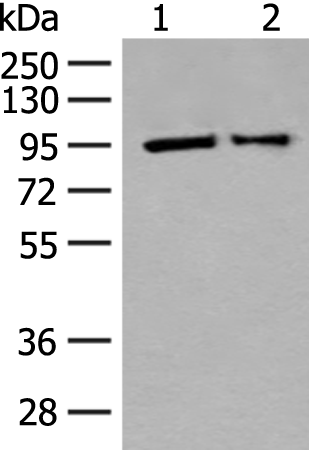
| WB | 咨询技术 | Human,Mouse,Rat |
| IF | 咨询技术 | Human,Mouse,Rat |
| IHC | 咨询技术 | Human,Mouse,Rat |
| ICC | 技术咨询 | Human,Mouse,Rat |
| FCM | 咨询技术 | Human,Mouse,Rat |
| Elisa | 1/5000-1/10000 | Human,Mouse,Rat |
| Aliases | FDH; FTHFD; 10-fTHF; 10-FTHFDH |
| WB Predicted band size | 99 kDa |
| Host/Isotype | Rabbit IgG |
| Antibody Type | Primary antibody |
| Storage | Store at 4°C short term. Aliquot and store at -20°C long term. Avoid freeze/thaw cycles. |
| Species Reactivity | Human, Mouse, Rat |
| Immunogen | Fusion protein of human ALDH1L1 |
| Formulation | Purified antibody in PBS with 0.05% sodium azide and 50% glycerol. |
+ +
以下是3篇关于ALDH1L1抗体的参考文献,包含文献名称、作者及摘要内容概括:
---
1. **文献名称**: *ALDH1L1 is a marker of malignant astrocytic cells and a predictor of poor survival in gliomas*
**作者**: Capper D, et al.
**摘要**: 该研究通过免疫组化(使用ALDH1L1抗体)分析脑胶质瘤样本,发现ALDH1L1在恶性星形细胞中高表达,且其缺失与患者生存率降低相关,提示其作为预后标志物的潜力。
---
2. **文献名称**: *Loss of ALDH1L1 expression is associated with poor prognosis in hepatocellular carcinoma*
**作者**: Liu PH, et al.
**摘要**: 通过Western blot和免疫组化(兔抗人ALDH1L1多克隆抗体)发现,ALDH1L1在肝癌组织中表达显著下调,其低表达与肿瘤进展和患者生存期缩短相关,提示其抑癌作用。
---
3. **文献名称**: *ALDH1L1 as a functional marker of folate metabolism in colorectal cancer*
**作者**: Krupenko SA, et al.
**摘要**: 研究利用ALDH1L1特异性抗体(克隆号HPA040038)检测结直肠癌组织,证实ALDH1L1通过调控叶酸代谢抑制肿瘤生长,其表达缺失可能促进癌变。
---
4. **文献名称**: *ALDH1L1 expression identifies a distinct population of neural progenitor cells*
**作者**: Molyneaux BJ, et al.
**摘要**: 在小鼠模型中,使用ALDH1L1抗体(兔多克隆抗体)标记发现该蛋白特异性表达于神经干细胞亚群,为研究神经发育和再生提供了新靶点。
---
以上研究均通过不同实验方法(免疫组化、Western blot等)验证了ALDH1L1抗体的应用,并探讨了其在疾病机制或生物标志物中的意义。
The ALDH1L1 antibody targets aldehyde dehydrogenase 1 family member L1 (ALDH1L1), a metabolic enzyme critical in folate metabolism. ALDH1L1 catalyzes the conversion of 10-formyltetrahydrofolate to tetrahydrofolate and CO₂, coupled with NADPH production, linking one-carbon metabolism to cellular redox regulation. It is highly expressed in tissues with active proliferation, such as the liver, kidney, and brain, and is proposed to act as a tumor suppressor due to its frequent downregulation in cancers.
ALDH1L1 exists in cytoplasmic and mitochondrial isoforms, generated via alternative splicing or transcription start sites. The cytoplasmic form (ALDH1L1) is the predominant isoform, while the mitochondrial variant (ALDH1L2) shares structural homology but differs in subcellular localization. Antibodies against ALDH1L1 are widely used in research to study its expression patterns, localization, and functional roles in diseases.
In cancer biology, ALDH1L1 loss correlates with poor prognosis, and its reactivation suppresses tumor growth. In neuroscience, it is implicated in neurodegenerative disorders, potentially influencing oxidative stress pathways. ALDH1L1 antibodies are validated for techniques like immunohistochemistry, Western blotting, and immunofluorescence, often requiring specificity checks due to homology with ALDH1L2. Researchers also utilize these antibodies to explore metabolic reprogramming in diseases and identify therapeutic targets. Commercial antibodies are typically raised against conserved regions (e.g., C-terminal catalytic domain) and verified using knockout controls to ensure reliability.
×